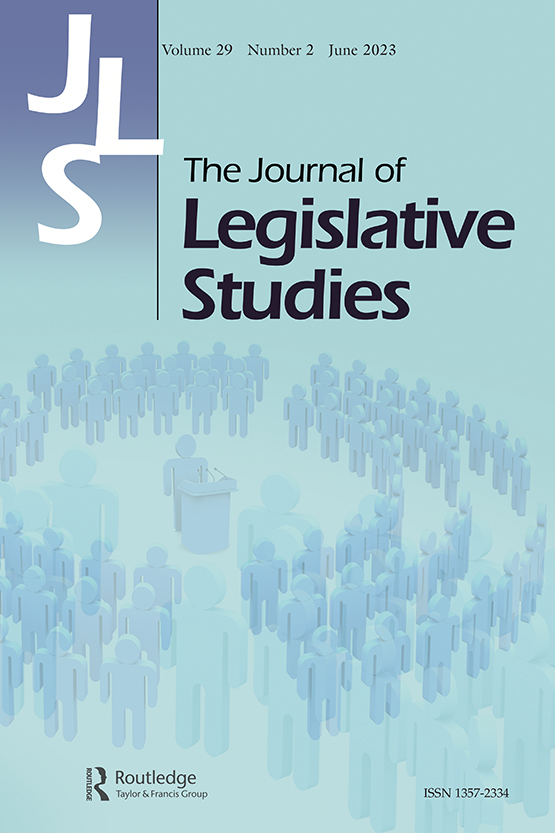آشنایی با مجله :
مجله مطالعات قانون گذاری یک مجله معتبر بین المللی است که تمام جنبه های تحقیق و توسعه قانونگذاری را پوشش می دهد و هدف آن محققان و ذینفعان مطالعات قانونگذاری است.

:Subject
Effects of citizen participation in the social accountability of budget amendments (2020)
موضوع مقاله:
اثرات مشارکت شهروندان در پاسخگویی اجتماعی اصلاحات بودجه
خلاصه ای از مقاله :
The paper investigates two Brazilian legislative innovations called Participatory Amendments to analyses their effects on electoral connection and on the social accountability of public budgeting. Previous studies have focused on participatory mechanisms in local governments and mainly on the formulation phase of public budgeting. Thus, we aim to fill this theoretical
gap by exploring the case of two initiatives designed by congressmen that use direct participation to modify the current modus operandi of deciding and monitoring individual parliamentary amendments to the budget bill
این مقاله به بررسی دو نوآوری قانونگذاری برزیل به نام اصلاحات مشارکتی برای تجزیه و تحلیل اثرات آنها بر ارتباط انتخاباتی و پاسخگویی اجتماعی بودجه ریزی عمومی می رود. مطالعات قبلی بر مکانیسم های مشارکتی در دولت های محلی و عمدتاً بر مرحله تدوین بودجه ریزی عمومی متمرکز شده اند .
بنابراین، هدف ما این است که این شکاف نظری را با بررسی مورد دو ابتکار طراحی شده توسط نمایندگان کنگره که از مشارکت مستقیم برای اصلاح روش فعلی تصمیمگیری و نظارت بر اصلاحیههای جداگانه مجلس بر لایحه بودجه استفاده میکنند، پر کنیم.
نکات کلیدی مقاله :
Our results showed that these initiatives changed the decision-making process in terms of power of actors and quality of projects, while increasing the electoral connection, and can mitigate some accountability traps by amplifying voice and by sharpening teeth, especially if associated with capacity-building programmes and monitoring mechanisms
نتایج نشان داد که این ابتکارات فرآیند تصمیمگیری را از نظر قدرت بازیگران و کیفیت پروژهها تغییر داده و در عین حال ارتباط انتخاباتی را افزایش داده و میتواند با تیز کردن گوش ها (حساس کردن مردم) ، برخی از تلههای پاسخگویی را کاهش دهد، به ویژه اگر با ظرفیت زیر ساختی برنامه ها و مکانیسم های نظارتی همراه باشد.
The study observed two Brazilian legislative innovations called Participatory Amendments in order to analyses how these initiatives modify public budget decision-making process and the implications of these changes. We observed that these initiatives enable citizens to directly access the debate and vote phase of the Brazilian budget cycle and help holding representatives accountable during the legislative debate phase of the budget cycle. At the same time, they can be used as a political-electoral strategy to increase the capillarity of the mandates in the states, improve electoral connection and help fight the local opposition
این مطالعه دو نوآوری قانونی برزیل به نام اصلاحات مشارکتی را مشاهده کرد تا بررسی کند که چگونه این طرحها بودجه عمومی را تغییر میدهند. فرآیند تصمیم گیری و پیامدهای این تغییرات. ما مشاهده کردیم که این ابتکارات شهروندان را قادر می سازد تا مستقیماً به مرحله بحث و رأی گیری چرخه بودجه برزیل دسترسی داشته باشند و به پاسخگویی نمایندگان در طول مرحله بحث قانونگذاری چرخه بودجه کمک کنند. در عین حال، می توان از آنها به عنوان یک استراتژی سیاسی-انتخاباتی برای افزایش اختیارات در ایالت ها، بهبود ارتباط انتخاباتی و کمک به مبارزه با مخالفان محلی استفاده کرد.
Hence, our findings add to the emergent theory of social accountability and to legislative studies the proposition that arrangements focusing on citizen participation in public budgeting in the legislative branch that also contributes to revitalizing the electoral connection hampered by proportional representation might act as a win-win game for MPs and citizens. On the one hand, if they facilitate credit claiming and electoral rewards, they may act as an incentive to MPs to create and sustain similar initiatives. On the other hand, they can mitigate some accountability traps by amplifying voice and by sharpening teeth
از این رو، یافته های ما به نظریه نوظهور پاسخگویی اجتماعی و به مطالعات قانونی این پیشنهاد را اضافه می کند که ترتیبات متمرکز بر شهروندان مشارکت در بودجه عمومی در قوه مقننه که همچنین به احیای ارتباط انتخاباتی که توسط نمایندگی انتسابي مختل شده است کمک می کند، ممکن است به عنوان یک بازی برد-برد برای نمایندگان مجلس و شهروندان عمل کند. از یک سو، اگر آنها مطالبه اعتبار و پاداش های انتخاباتی را تسهیل کنند، ممکن است به عنوان انگیزه ای برای نمایندگان مجلس برای ایجاد و حفظ ابتکارات مشابه عمل کنند. از سوی دیگر، آنها می توانند برخی از تله های مسئولیت پذیری را با تقویت صدا و با تیز کردن دندان ها کاهش دهند.
These initiatives were born in a context of negative media towards parliamentary amendments, lack of territorial connection, and a widespread lack of knowledge on how public budgeting works, notably the processes and responsibilities of each political actor. Nonetheless, they might also shed light on understanding the conditions and incentives to establish an effective participatory and accountability mechanism in the legislative branch and a stronger representative-represented connection. In fact, the educational aspect seems to be intertwined with all other factors since without it, none of the benefits for each side is possible and participation, accountability, or electoral rewards will be more symbolic than real
این ابتکارات در زمینه اخبار منفی نسبت به اصلاحات پارلمانی، فقدان ارتباط سرزمینی، و فقدان دانش گسترده در مورد نحوه عملکرد بودجه عمومی، به ویژه فرآیندها و مسئولیت های هر یک از بازیگران سیاسی، متولد شدند. با این وجود، آنها همچنین می توانند درک شرایط و انگیزه های ایجاد یک مکانیسم مشارکتی و پاسخگویی موثر در قوه مقننه و یک ارتباط قوی تر با نمایندگان را روشن کنند. در واقع به نظر می رسد که جنبه آموزشی با همه عوامل دیگر در هم تنیده است زیرا بدون آن هیچ یک از منافع برای هر یک از طرفین امکان پذیر نیست و مشارکت، پاسخگویی یا پاداش های انتخاباتی بیشتر نمادین خواهد بود تا واقعی.
برای مشاهده اصل مقاله اینجا کلیک کنید.
ترجمه: سیدمحمد حیدری












